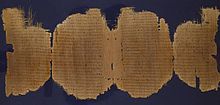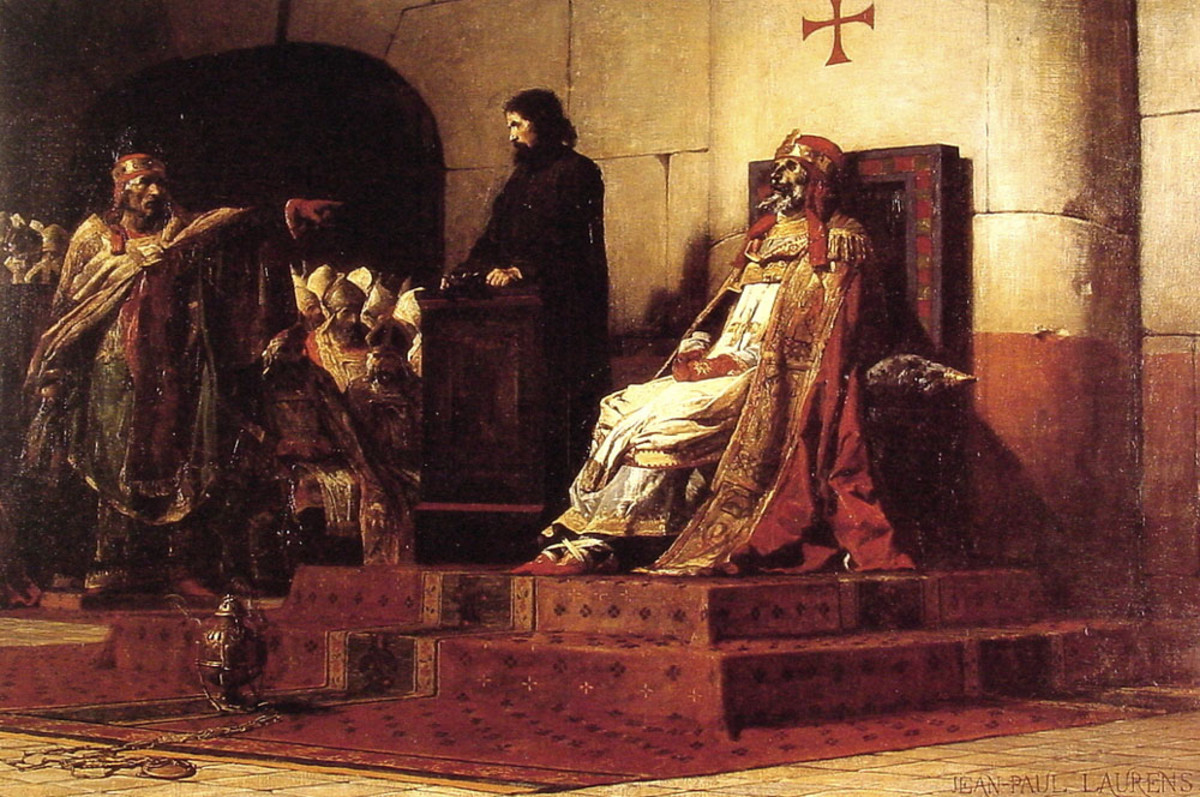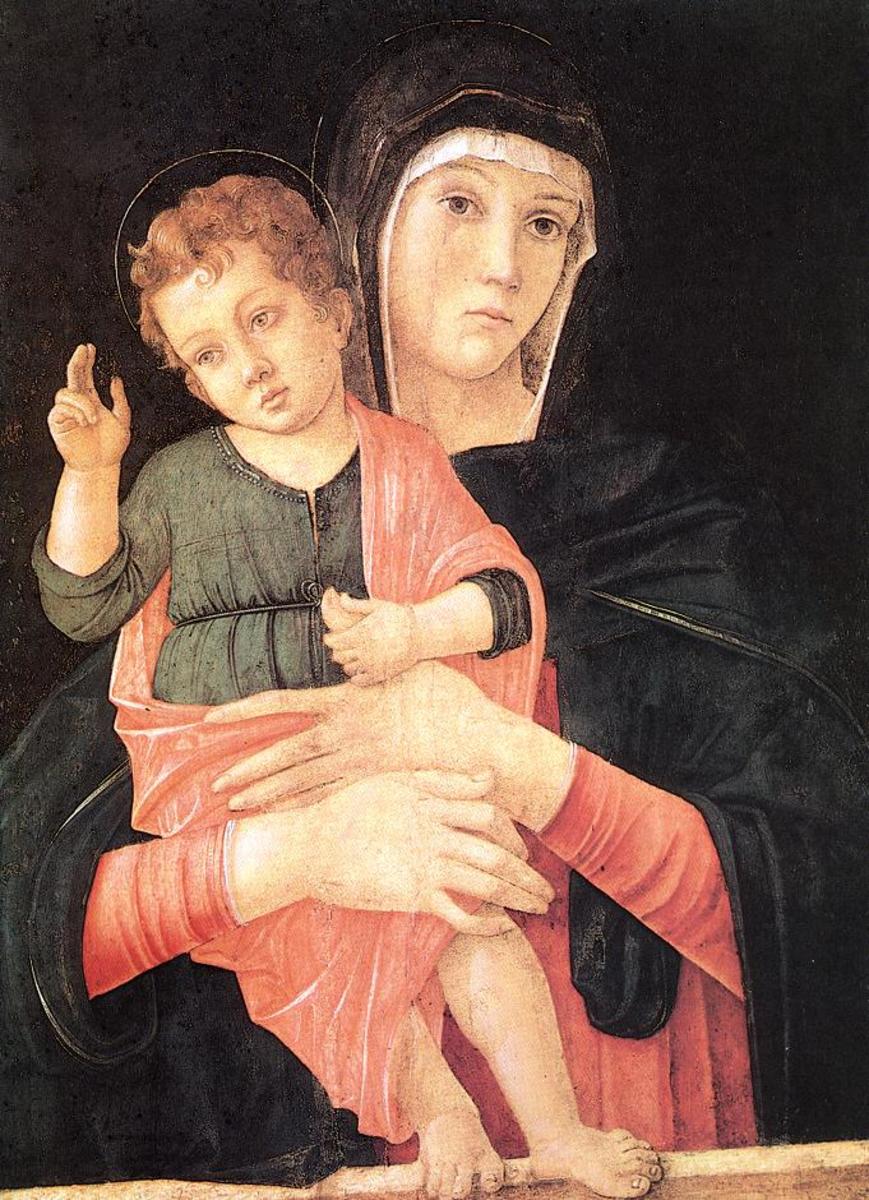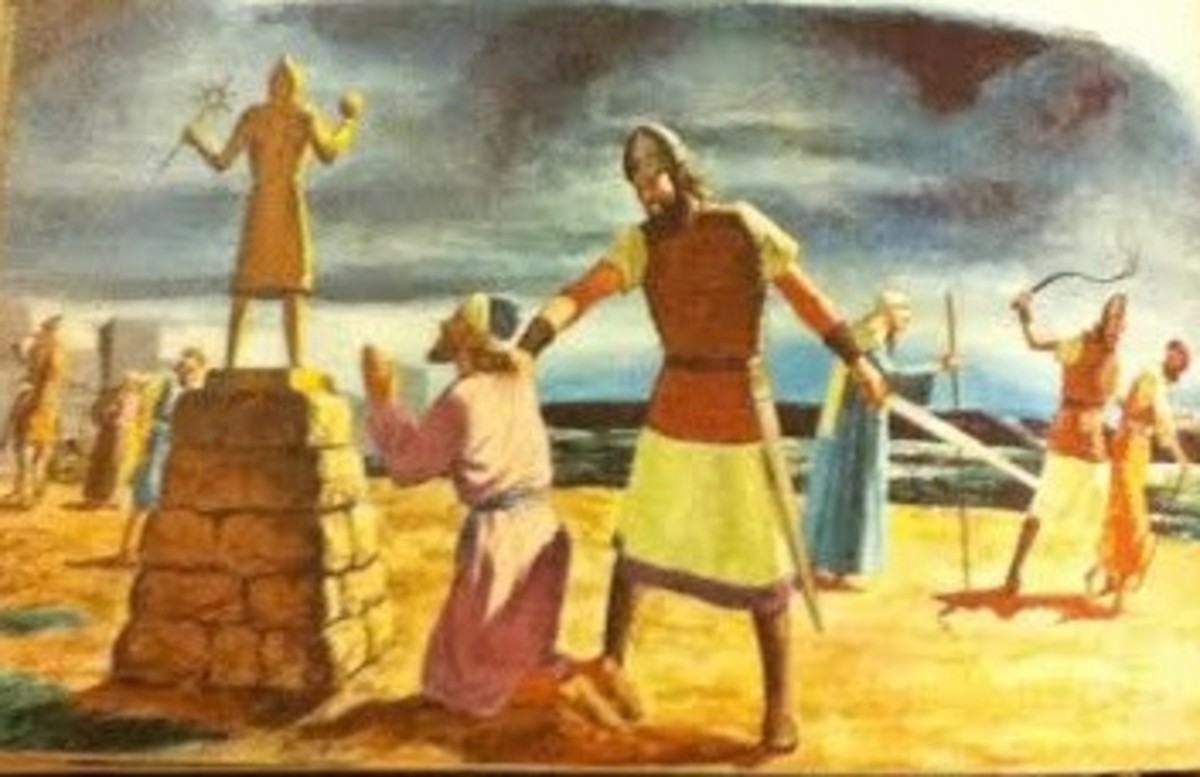Jesus. Fact or fiction?
The documents we are talking about

First things first
I have a Theological background with a Certificate in Religious studies from Cambridge University and my Bible College diploma is now given degree equivalency from Sheffield University. I've spent the last thirty years being told that people who believe the Bible to be literal and accurate basically belong to the "Flat Earth Society" so for the last thirty years I've been researching different parts of the Bible to see if it stands up to scrutiny.
Rather than try to tell you that "I'm looking into it" and then lead you down the Garden path I want to take the time to show you why I think that Jesus is a real person who walked and talked in Ancient Israel, that he did have disciples and that they went out and changed the world.
First of all the idea of doubting whether Jesus was a real person is nothing new. That first started back in the first century, nothing has changed in that respect, and I don't really expect it to change all that much in response to this hub, it's just that having read Catherine Giordano's hub Did Jesus Exist or Is It All a Myth? I felt the need to present the case for the real Jesus.
This isn't a discussion on whether Jesus was merely Human or God incarnate, but more a presentation of the Historical data that shows he really did walk the earth.

The History
Before I can start answering about the "Mythologizing" of Jesus and looking at the stories of his healing the sick we need to look at the Historical records and deal with why there seems to be so little evidence for such a man. After all, if he was so great then shouldn't we have a much better picture of him?
The Romans were amazing administrators , but not that amazing. Jesus wasn't a Prince or an important Roman official, they had their deeds recorded, average humans didn't! Jerusalem wasn't Rome, it wasn't the center of the world at the time, it was a backwater province that the Romans didn't care too much about except for the fact that it was a buffer state between their vital supply field of Egypt and their deadliest enemies the Parthians. Israel and Jerusalem were of little importance for them except to keep the peace and protect Egyptian grain.
How many Roman Historians write anything about Jesus? Five
Only five? Yes
Why not more? Well simply because Jesus was from a backwater and for the first few years that's where Christianity was, as it spread it finally made it to where the Romans began to take notice of it.
The four Historians were
- Thallus. (Circa AD50) Not a lot known about this Historian except that he wrote three books on history and in particular about the fall of Troy. Most of his works were lost but fragments were preserved in other writings or later authors.
He's important because he writes about a solar eclipse that happened in AD 28 over Israel that could have been the time of the Crucifixion. "On the whole world there pressed a most fearful darkness; and the rocks were rent by an earthquake, and many places in Judea and other districts were thrown down. This darkness Thallus, in the third book of his 'History', calls, as appears to me without reason, an eclipse of the sun." Is this a plant by later Christian writers to deceive us into thinking that it was real?
- Flavius Josephus. Jewish Historian and one of the leaders in the Jewish rebellion of 70 AD. By AD 72 Josephus who was commander of the Jewish Zealots in Galilee realized that they were going to lose (could be the fact that four Roman Legions had crossed into Israel intent of crushing all resistance. Josephus surrendered and literally defected to the Romans. Later he was to write a complete history of the Jewish people for the Romans to explain why the Jews were the way they were. Here is an excerpt of what Wikipedia says about Josephus and the texts that refer to Jesus.
The extant manuscripts of the writings of the 1st-century Romano-Jewish historian Flavius Josephus include references to Jesus and the origins of Christianity.[1][2] Josephus' Antiquities of the Jews, written around 93–94 AD, includes two references to the biblical Jesus Christ in Books 18 and 20 and a reference to John the Baptist in Book 18.[1][3]
Scholarly opinion on the total or partial authenticity of the reference in Book 18, Chapter 3, 3 of the Antiquities, a passage that states that Jesus the Messiah was a wise teacher who was crucified by Pilate, usually called the Testimonium Flavianum, varies.[4][5][1] The general scholarly view is that while the Testimonium Flavianum is most likely not authentic in its entirety, it is broadly agreed upon that it originally consisted of an authentic nucleus, which was then subject to Christian expansion/alteration. [5][6][7][8][9][10] Although the exact nature and extent of the Christian redaction remains unclear,[11] there is broad consensus as to what the original text of the Testimonium by Josephus would have looked like.[9]
Modern scholarship has largely acknowledged the authenticity of the reference in Book 20, Chapter 9, 1 of the Antiquities to "the brother of Jesus, who was called Christ, whose name was James" [12] and considers it as having the highest level of authenticity among the references of Josephus to Christianity.[13][1][2][14][15][16] However, New Testament scholar Robert M. Price speculates that Josephus may have considered James a fraternal brother rather than a sibling.[17]
So, some of Josephus can be accepted as genuine and some of it can't!
Thallus and Josephus
- Josephus
This site reveals even more information that I just haven't got room to explore. It's exciting and changes the way we will see Josephus. maybe he wrote the inscription after all! - Thallus (historian) - Wikipedia, the free encyclopedia
Read Josephus' account for yourself
3. Seutonius
Gaius Seutonius Tranquillus was a man of equestrian rank (Middle class) born around 69 AD who during the reign of Emperor Hadrian wrote the treatise "The Twelve Caesars" detailing the lives of the earliest Caesars of the Roman Republic.
Alongside Emperor Claudius (who was also a historian and whose works did not come down to us in complete form) he is the one who tells us the most about the time and the Emperors of the time.
Seutonius is more interested in how things directly affect Rome and the Empire, not necessarily what is going on in the provinces but he does tell us some interesting things.
Seutonius is the one that tells us that in AD 49 there was a riot in Rome in the Jewish quarter. Here is the reference in the Twelve Caesars."Since the Jews constantly made disturbances at the instigation of Chrestus, he expelled them from Rome." By the way, "Christ" is not a name but a title! It's the Greek equivalent of the Hebrew title "Messiah" or "Anointed one".
The book of Acts also refers to an expulsion of the Jews from Rome around that time."And he found a certain Jew named Aquila, a man of Pontus by race, lately come from Italy, with his wife Priscilla, because Claudius had commanded all the Jews to depart from Rome: and he came unto them" (Acts Chapter 18 verse 2) whether it's a reference to Christ is up for debate among scholars but the fact that the two records mention the event makes for a big coincidence!
Seutonius also mentions that Nero persecuted the Christians starting around AD 66 Here is how he puts it. "During his reign many abuses were severely punished and put down, and no fewer new laws were made: a limit was set to expenditures; the public banquets were confined to a distribution of food; the sale of any kind of cooked viands in the taverns was forbidden, with the exception of pulse and vegetables, whereas before every sort of dainty was exposed for sale. Punishment was inflicted on the Christians,[44] a class of men given to a new and mischievous superstition. He put an end to the diversions of the chariot drivers, who from immunity of long standing claimed the right of ranging at large and amusing themselves by cheating and robbing the people. The pantomimic actors and their partisans were banished from the city." (Both pasted from Wikipedia)
So by AD 66 Christianity was already a "New and mischievous superstition" (How long did they have to develop that idea? the Christians that is?)
Seutonius
- Suetonius
- Suetonius | biography - Roman author | Britannica.com
Roman biographer and antiquarian whose writings include De viris illustribus (“Concerning Illustrious Men”), a collection of short biographies of celebrated Roman literary figures,...
Learn what Seutonius wrote
How Christianity crushed Rome
4. Pliny the Younger
Born around AD 61 and was a witness to the eruption of Vesuvius that buried Pompeii. Pliny the younger was a prolific letter writer and it's mostly in his letters that he leaves the records that we are interested in.
As a Roman officer Pliny the Younger held trials for Christians in the provinces. He was governor of Bithinya (a province in modern day Turkey) and this is what his letters reveal.
As the Roman governor of Bithynia-Pontus (now in modern Turkey) Pliny wrote a letter to Emperor Trajan around 112 AD and asked for counsel on dealing with Christians. In the letter (Epistulae X.96) Pliny detailed an account of how he conducted trials of suspected Christians who appeared before him as a result of anonymous accusations and asked for the Emperor's guidance on how they should be treated.[18] Pliny had never performed a legal investigation of Christians, and thus consulted Trajan in order to be on solid ground regarding his actions, and saved his letters and Trajan's replies.[19] Neither Pliny nor Trajan mention the crime that Christians had committed, except for being a Christian; Trajan's response to Pliny makes it clear that being known as a "Christian" was sufficient for judicial action.[20] The correspondence between Pliny and Emperor Trajan shows that the Roman Empire, as a government entity, did not at this time “seek out” Christians for prosecution or persecution.[21] Pliny's letter is the earliest surviving Roman document to refer to early Christians.[22
5. Tacitus
As a Roman Senator Tacitus wrote sometime in the latter part of the first century and his writings deal mostly with the lives of the early Emperors of Rome (From Julius Caesar until AD 69 when Rome had four emperors in one year!) He writes about the Christians in respect to Nero and his persecution of the Christians (the first systematic persecution that they would suffer, the first of ten documented times when it would break out against the Christians)
"Consequently, to get rid of the report, Nero fastened the guilt and inflicted the most exquisite tortures on a class hated for their abominations, called Christians by the populace. Christus, from whom the name had its origin, suffered the extreme penalty during the reign of Tiberius at the hands of one of our procurators, Pontius Pilatus, and a most mischievous superstition, thus checked for the moment, again broke out not only in Judæa, the first source of the evil, but even in Rome, where all things hideous and shameful from every part of the world find their centre and become popular. Accordingly, an arrest was first made of all who pleaded guilty; then, upon their information, an immense multitude was convicted, not so much of the crime of firing the city, as of hatred against mankind".
Why only the five?
Christianity started in Judea, a backwater of the Empire, Jesus was born when Judea was a 'client kingdom' of Rome and wasn't part of the Empire proper. Herod the Great had been given his Kingdom as a reward for faithfully rallying Roman troops against the Parthians who had tried to take over the region in 45 BCE. It would remain a client kingdom until 3 BCE and his death. Even after that Judea was given special status in the Empire and allowed to set most of it's own rules (as long as the taxes were paid) so the Romans weren't concerned about the strange prophets and holy men running around at the time (the Bible itself records a number of them besides Jesus! Read Acts chapter 5
36 For before these days rose up Theudas, giving himself out to be somebody; to whom a number of men, about four hundred, joined themselves: who was slain; and all, as many as obeyed him, were dispersed, and came to nought.
37 After this man rose up Judas of Galilee in the days of the enrolment, and drew away some of the people after him: he also perished; and all, as many as obeyed him, were scattered abroad.
Why only five? To be honest I'd be more worried if it were more as that would speak to me of the early church "fiddling the books!" Also the fact that the written surces are so brief in what they say lends to them actually being authentic. There are scholars who disagree with this, there will always be those who disagree but it doesn't take away from the fact that the brevity of the references tell us that they haven't been tampered with in the way that some would accuse Christians of doing
All of the sources I have quoted can be traced back to the first or early second century and all of them are agreed upon by scholars in the area, they all point to one thing, that Christianity had a founder, a Human being who walked this earth. Beyond that at this stage I won't say (but anyone who reads my hubs will know where I stand on the issue).
Jesus and the Essenes
There is a lot of similarity between Jesus' teaching and that of the teacher of righteousness in the Essene community. There is also a lot of difference!. Listed below are a few sites that help you see the similarities and the differences between the two. Jesus' teachings didn't just use the Essenes but he also used the teachings of both Rabbinical schools of the time and some of his own unique teachings.
Jesus and the essenes
- Essenes - Wikipedia, the free encyclopedia
- Jesus Christ and the Essenes: Similarities and Differences
Gives a brief description of the similarities and differences of Jesus and the essenes. written by an expert on the Dead Sea scrolls
Non Biblical evidence
What do you think?
have you come across these writers before?
One site I use all the time
- Bringing the Ancient World to Life – Biblical Archaeology Society
Have you had your Biblical archaeology today? Find out what archaeology can reveal to anyone eager to understand the world of the Bible. Ac
In conclusion
Presented in this hub is just the non biblical evidence for Jesus. I have not included any of the manuscripts and fragments that have come to light over the years. There is so much information that it would take at least two or three hubs to cover all of it.
The earliest gospels that we have (complete) are from the third and fourth centuries, but we have fragments from as early as 90 AD (that fragment is of Mark's gospel and was only found two years ago, I will put links below). At the time of writing the experts examining the fragment have not revealed how much of the gospel it contains but have said that it is enough to either confirm or radically alter what we know of early christian beliefs!. the second earliest is of John's gospel and dates from around 125 AD. It is on display at the John Rylands library in the University of Manchester, England. What is strange about this one is that the papyrus is written on both sides indicating that it was from a codex (early manually bound book)
Scholars tell us that they are finding on average two or three fragments a year from the first four centuries of Christianity (one found three years ago was a fourth century fragment telling us of at least one early christian group who believed Jesus was married!)
Of the fragments we have at least one from the first century and approximately two hundred from the second century covering roughly 43% of the entire New testament. There are over 10,000 codex's (early books) and fragments from the first century to the tenth century (most are around the third or fourth century). When a Bible is translated all of these fragments and codex's are taken into account.
Have I covered everything that was in Catherine's hub? probably not even close, but if I keep going this is going to be a book and not a hub so I'll stop this hub here and wait to hear from folks as to what we look at next.
Did Jesus really exist? Personally I believe he did! but I'll let you read the evidence and make your own decisions.
Sorry if I haven't covered the things you wanted me to cover but if you leave a note in the comments below I will seek to try and answer your questions.












